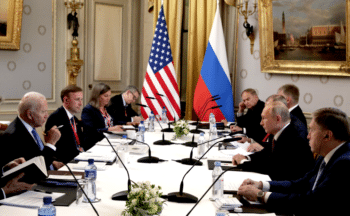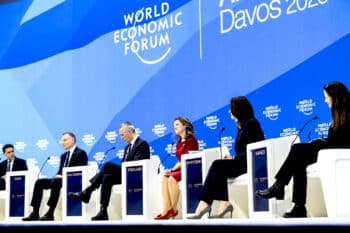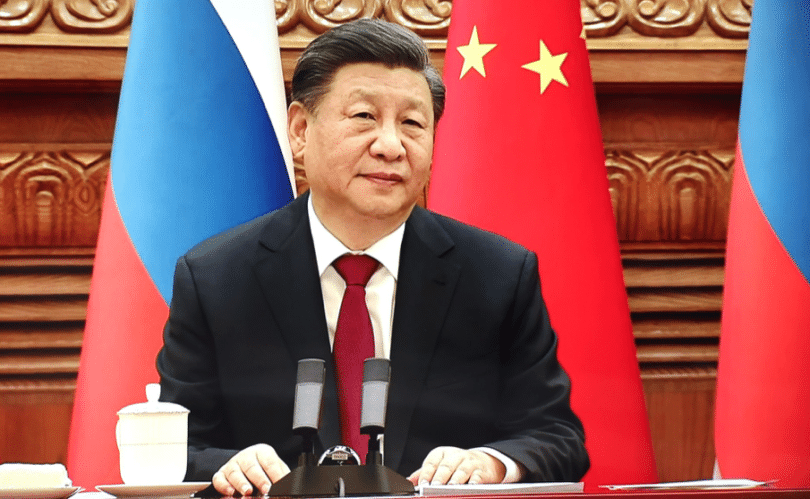The tragic year-long war in Ukraine has already transformed the world’s geopolitical landscape.
Historic global power shifts towards the Eurasian heartland, centred on China, are accelerating. China and Russia have drawn together in a strong “no limits” partnership, that is attracting other major states in the Global South, especially India, Iran, Saudi Arabia, the Gulf States, Turkey, Brazil and South Africa.
The common link is on building stronger trading, infrastructure and diplomatic ties, consistent with the U.N.-based international security system. More and more, the Western camp led by the U.S. seems peripheral, a powerless spectator to these global changes.
The Ukraine crisis is a catalyst, accelerating changes that might have otherwise taken decades to work through.
Mediocre Western leaders like U.S. President Joe Biden, German Chancellor Olaf Sholtz, French President Emmanuel Macron and a conga line of weak British prime ministers, allied with the improbable former comedian heading a nationalist regime in Kiev united only by its fanatical hatred of all things Russian, have led the West into disastrous anti-Russian policies, causing self-inflicted wounds especially in Europe.
The root cause of the West’s current woes is the Washington elite’s refusal to come to grips with its own disasters at home: in a country increasingly weakened by stark ideological and economic contradictions.
Obsessed by the great power competition with Russia and China, the Washington elite at the same time repeatedly under-estimates Russian and Chinese diplomatic skills and will to survive. A bipartisan war party drains Washington’s budgets as America’s key infrastructure frays.
Hundreds of billions go to prop up NATO’s unwinnable proxy war against Russia in Ukraine: a war which actually began in February 2014, not 2022. Influential Americans saw Ukraine as a weapon to destabilise Russian President Vladimir Putin, by turning the two most populous ex-Soviet nation-states against each other. They connived with Ukrainian Banderite extreme nationalists to militarise and indoctrinate Ukraine against Russia.
For the U.S. whichever side won the U.S. arms industry prospered. Russian diplomatic efforts in 2014-21 to maintain peace with a sovereign Kiev through the Minsk process were negated by Western duplicity.

U.S.-Russian talks in Geneva, June 2021. (Kremlin)
Meanwhile the Ukrainian army was expanded and hardened by NATO weapons and training. A long-running artillery war waged by Kiev against its pro-Russian dissident eastern provinces Donetsk and Lugansk, ignored by Western media, left up to 14,000 dead and over 100,000 homeless.
Testing Putin’s Resolve
By December 2021, Washington and Kiev judged themselves strong enough to test Putin’s resolve. He was faced with lose-lose. If he allowed Kiev a genocidal victory over the Donbass rebel provinces, his credibility as Russian leader would slump.
He could only defend Donbass by invading sovereign Ukraine, possibly to demilitarize and denazify Ukraine. He chose this lesser evil, seeing the Donbass crisis as having become an existential threat to Russia.

Site of the Nord Stream 2 attack. (Danish Defense Ministry)
After an inconclusive first seven months, the war has turned in favour of a determined-to-win Russia. This is certainly how China and the global South see it, unconvinced by increasingly improbable claims by Ukrain’s President Volodymyr Zelensky and NATO that Kiev can still win this war.
The China – Russia partnership is built on their mutual adherence to the U.N. Security Council rules-based order, and on their support for the Five Principles of Peaceful Coexistence, which was drafted by Chinese Foreign Minister Zhou Enlai in 1953 and adopted by the 1995 Non-Aligned Conference in Bandung.
Western Rules
In recent years an opportunistic U.S. and its Western allies have pressed for another kind of international order – a “rules-based order” in which the West sets the rules and decides when and how to enforce them on others.
Since the Soviet collapse in 1991, the dogma of eternal Sino-Soviet geopolitical rivalry has been holy writ in the West. It took the brilliantly inept Trump and Biden administrations to make enemies of both great powers simultaneously, pushing them together: while the Global South looked on appalled as Washington used its own “rules- based order” to bully weaker states.
The Ukraine war has magically clarified this imbroglio. The Global South now respects Russia and China as major status quo powers, and as united defenders of the U.N. Security Council-based global security order. The U.S. has been exposed as a reckless global bully and rules-breaker.
The East-West information war which in February 2022 seemed securely in Western hands has escaped from their control.

Restoring Peace session at World Economic Forum in Davos on Jan. 18, from left: CNN’S Fareed Zakaria, host; Polish President Andrzej Duda, NATO Secretary-General Jens Stoltenberg, Canadian Deputy Prime Minister Chrystia Freeland, Ukrainian First Deputy Prime Minister Yuliia Svyrydenko, U.S. National Intelligence Director Avril Haines. (World Economic Forum/Mattias Nutt, CC BY-NC-SA 2.0)
Western-supported terrorist actions in and around the Ukraine war – in the terrorist trifecta in September 2022 of the U.K.-Ukrainian sabotage attack on the Kerch Bridge, the U.S.-Norwegian sabotage of the Russian-German Baltic pipelines and the brutal murder near Moscow of Maria Dugina — sullied the West’s good name.
Large majorities in the Global South now trust Russia and China more than they trust the West. Notwithstanding some recent U.N. General Assembly votes – the result of heavy U.S. arm-twisting of vulnerable smaller states — the reality is there to be seen in shifting trade statistics and in the diplomatic dance.
Western Power Elites
In the G20, the Global South is no longer listening to the West. At Davos, Western power elites now speak only to themselves. After the Ukraine crisis, the Global South sees that China and Russia now offer more attractive global trading and reserve currency alternatives or supplements to the American-dominated dollar system, which Western sanctions have shown to be insecure. They are quietly spreading their risks, politically and economically.
With the discreet help of China, India, Iran and the Middle East entrepot city-states, Russia has sailed with ease through Western trade and banking sanctions. These have boomeranged to harm the U.S.-led bloc, especially through increasing energy costs and declining European trade competitiveness from blocking cheap Russian gas imports.
Once proud European states Germany and France have reverted to full lackey status, dependent on U.S. energy and weaponry.
Since 2014, Chinese-Russian diplomatic, trade and infrastructure links have grown robustly. Their equal-partner military cooperation is now entrenched.
China exports many dual-use high technology products to Russia. China does not need to supply Russia with weapons: but if it ever thought it needed to, it would. Because China knows that if Russia collapsed under Western sanctions, it would be next.
The importance of the Ukraine crisis has been to crystallize Chinese leadership perceptions of the U.S. as an untrustworthy partner, and the existential enemy of both China and Russia.
China’s proposal on the Political Settlement of the Ukraine Crisis. pic.twitter.com/pFVi9D8q8g
— Yu Dunhai (@YDunhai) February 25, 2023
Even under President Donald Trump, the U.S. tried to provoke destabilization and regime change in China: around Hong Kong, Xinjiang, Taiwan and in the South China Sea. In trying so clumsily to portray China as an aggressor, the U.S. finally convinced China’s leadership that the U.S. has at least since 2014 pursued aggressive strategies towards Russia and China.
In the past month, the pace of Chinese global diplomacy has quickened. The Chinese Foreign Minister Wang Yi was received last week by Russian Foreign Minister Sergei Lavrov; Nikolai
Patrushev, head of national security, and Putin himself, when he visited Moscow as a precursor to a March-April visit by Chairman Xi Jinping which will announce far-reaching new economic cooperation.
China has recently launched an activist peace diplomacy, setting out its “Position on the Political Settlement of the Ukraine Crisis.” This impressive general document, based on the U.N. Charter and the Five Principles, indicates China’s support for an immediate ceasefire without preconditions; no more Western arms supplies; and offering massive reconstruction aid to a post-settlement new government in Ukraine.
It will be attractive to the Global South. It will cause consternation in the Western war party camp. Russia has welcomed it. We will see the Chinese peace plan talked about in coming weeks. It may offer the breakthrough for peace for which many Ukrainians pray.
Tony Kevin is a former Australian senior diplomat, having served as ambassador to Cambodia and Poland, as well as being posted to Australia’s embassy in Moscow. He is the author of six published books on public policy and international relations.

